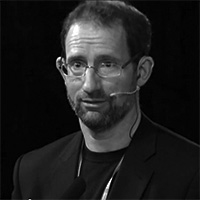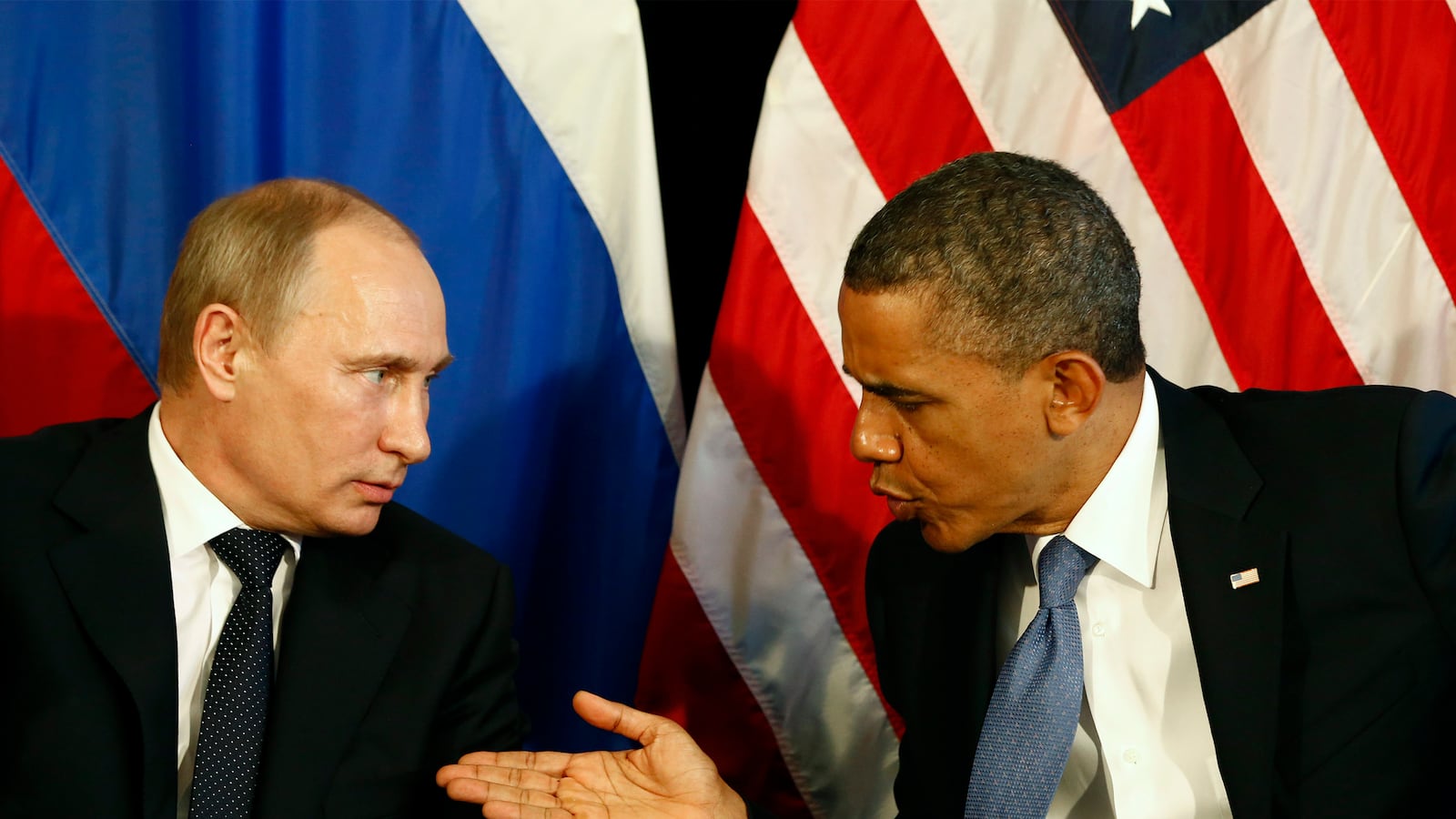Vladimir Putin has turned on the charm. On the eve of his meeting with U.S. President Barack Obama, he has shifted his rhetoric from bad cop to good cop, lavishly praising U.S. culture in an interview with Charlie Rose of CBS News. “The U.S. exerts enormous influence on the world situation as a whole. I like their creativity when it comes to tackling problems, their openness and open-mindedness, because it allows them to unleash the inner potential of the people,” he said.
KGB agents seldom let out their inner good cop by accident, and Putin is no exception. His interview carries clear signs of what he will be looking for in his meeting with Obama: the “open-mindedness” to admit that U.S. policy in Syria has failed, President Bashar Assad is the only Syrian actor capable of defeating terrorism, and the best thing the U.S. could do would be to stop ostracizing Russia and join it in fighting the so-called Islamic State terrorist group instead.
Given what he told Rose last night, there’s every expectation that Putin will use his meeting with Obama to criticize every aspect of U.S. policy, starting with its attempts to train the Syrian opposition:
“The initial aim was to train between 5,000 and 6,000 fighters, and then 12,000 more. It turns out that only 60 of these fighters have been properly trained, and as few as four or five people actually carry weapons, while the rest of them have deserted with the American weapons to join ISIS.”
He can also be expected to continue by ridiculing U.S. and Western claims that the Syrians they are supporting are, indeed, a force for moderation: “(Assad) is confronted with what some of our international partners interpret as an opposition. In reality, al-Assad’s army is fighting against terrorist organizations.”
He is likely to at least hint that the U.S.-led air campaign against IS is illegal, while its opposition to Assad is counterproductive: “Aid, including military assistance, can and must be provided exclusively to the legitimate government of one country or another, upon its consent or request… Any actions to destroy the legitimate government (of Syria) will create a situation you can witness in other countries of the region, or other regions such as Libya, where all state institutions are disintegrating.”
And having exposed the failure of U.S. policy militarily, diplomatically, and politically, he will then offer the way out: a grand alliance with Russia to support Assad against IS. “There is no other solution to the Syrian crisis than strengthening the effective government and rendering them help in fighting terrorism, and urging them to engage in positive dialogue with the rational opposition and conduct reform… We would welcome a common platform for collective action against the terrorists.”
The idea is attractive in its simplicity, but unfortunately for Putin, reality is rarely simple, especially in Syria. If Obama wants to pick holes in the Putin Plan, he could do it with four words: Iran, geography, gas, and Ukraine.
Putin and his foreign minister, Sergei Lavrov, have spoken at length in recent weeks about the need for an “anti-terrorist coalition.” However, they have not yet explained whom they expect to join it.
Assad’s key allies are Russia and Iran. Iran is engaged in bitter strategic competition in the region with Saudi Arabia, Turkey, and the Gulf States. The countries currently flying air strikes in northern Syria against IS under U.S. lead include Bahrain, Jordan, Saudi Arabia, Turkey, and the United Arab Emirates.
Putin told Rose that he has spoken personally with the kings of Jordan and Saudi Arabia and the president of Turkey, but bringing them into a military alliance which also includes Assad and Iran would require diplomatic finesse bordering on the miraculous.
Putin may have the miracle up his sleeve, but he has not yet shown it.
The second question is where any international coalition would operate. Assad’s forces are currently fighting IS in the center of the country, and an assortment of opposition and Islamist forces on the Turkish and Jordanian borders. The U.S. and its allies are fighting IS in the Kurdish-held north-east. There is no immediately obvious theater where they could effectively combine.
Neither Turkey nor Jordan is likely to countenance major international military action right on its own frontiers. The U.S. is unlikely to condone further strikes against the moderate opposition, while its Kurdish allies cannot be expected to welcome the prospect of pro-Assad ground troops fighting in their cities.
A military campaign by air and ground against IS in the center of Syria, around the ruins of ancient Palmyra, would at least involve an acceptable common foe. However, the question is where the ground forces would come from. Assad’s troops are finding it hard enough to hold their own territory against multiple opponents. No Western government will risk troops on the ground in the Middle East’s bloodiest quagmire. Will Russia send in ground troops of its own and ask the U.S. and Saudi Arabia for close air support? It is hardly likely, but it is a key question to ask.
The third word to mention is “gas.” Not the blue stuff on which Russia has built its economy, but the poisonous type used by Assad against his own people. One of the key omissions in Putin’s version of events is the extent to which Assad, rather than IS, fueled both the conflict and the refugee crisis through the indiscriminate use of poison gas, barrel bombs, and air strikes against civilians.
Even if IS could be defeated and the territory it has taken reclaimed by Assad’s forces, the thought that this would end the refugee flood is either naïve or ingenuous. Those forces have shown an ability to inflict suffering and punishment on civilians which may be less medieval than IS’s, but is no less deadly. Any reconquest of territory by Assad forces is likely to be accompanied by wholesale massacres and revenge attacks.
Even in terms of the purest realpolitik, Assad is simply not capable of reversing the conflict he started or convincing the migrants to come home. A victory for his forces would be more likely to trigger a second exodus than a triumphant return.
Putin needs to explain how an Assad victory—unlikely enough in itself—would benefit the Syrian people, their neighbors, and the wider world.
Finally, it would be a grave error not to mention Ukraine. Putin has very successfully avoided the subject in recent months, since he triumphantly took credit for the annexation of Crimea in a March documentary. However, he is not coming to New York as a respected international leader, but one who has been expelled from the Group of Eight leading industrial economies.
Putin is not on the front foot, for all his diplomatic posturing. His cronies are under sanctions, his economy is in nosedive, and his military is already showing the signs of being badly overstretched. As Obama could tell him all too well, sending troops into a strife-torn Muslim country is relatively easy; getting them out is a whole lot harder.
And Ukraine is not a problem which has been solved. While a tenuous ceasefire is now holding, the country is still divided, Russia still occupies Crimea and is building new bases along the border, and the Russian-backed separatists maintain the ability to relaunch hostilities any time they choose. Russia has yet to show any intention to resolve the crisis, let alone return Crimea, preferring to let the separatists keep their frozen conflict oven-ready. For the West to quietly forget what Putin has done there would send a disastrous signal to every one of Russia’s neighbors who fear Moscow’s reborn aggression.
Putin will be coming to New York hoping to hear lots about Syria and nothing at all about Ukraine. It is in the interests of the West as a whole to make sure that his hopes are not fulfilled.






